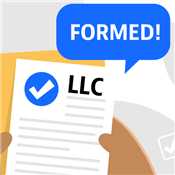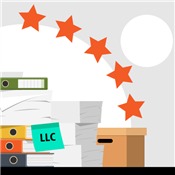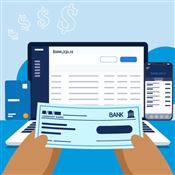Best Business Bank Account for Small Business
Ad Disclosure: This article contains references to products from our partners. We may receive compensation if you apply or shop through links in our content. This compensation may impact how and where products appear on this site. You help support CreditDonkey by using our links.
Discover the top 10 banks for small businesses. Unlock your business' potential with the best bank
 |
Here are the best places for opening a small business account:
- Bank of America for flexible checking account
- Capital One for high volume businesses
- Chase for best national bank
- Bluevine for online business banking
- Axos Bank for business checking with interest
- U.S. Bank for free business checking with a national bank
- Wells Fargo for SBA loans
- nbkc bank for minimal fees
- Live Oak Bank for high-yield business savings
- Relay for large teams and multiple accounts
- Found for one-person small businesses
- Lili for banking and accounting
- Novo for small online startups
- Digital Federal Credit Union for best credit union
Free Checking Account for Small Business Owners
- Sign up in 3 minutes; no credit check
- No account fees - $0 monthly fee, overdraft fee, foreign transaction fee, or ATM fees at approximately 40,000 locations
- Automatic Savings
- Get paid up to 2 days early
- Savings with up to 4.00% APY
Free Business Checking - Earn $500 Bonus
To earn the $500 bonus, customers must apply for a Bluevine Business Checking account anytime between now and 03/31/2026 using the referral code CD500.
After opening your account, deposit a total of $5,000 within the first 30 days. After 30 days, maintain a minimum daily balance of $5,000 while also completing at least one of the following eligibility requirements every 30 days for 90 days:
- Deposit at least $5,000 from eligible merchant services to your Bluevine account OR
- Make at least $5,000 of outbound payroll payments from your Bluevine account using eligible payroll providers OR
- Spend at least $2,000 on eligible transactions with your Bluevine Business Debit Mastercard® and/or Bluevine Business Cashback Mastercard®
Banking services provided by Coastal Community Bank, Member FDIC
No-Fee Business Checking
- $0 monthly service fee
- $0 minimum opening deposit
- Open up to 20 individual business checking accounts
- Earn up to 2.68% APY with automated savings
- Issue up to 50 Visa® debit cards to your team
Your business bank is not just a place to keep your hard-earned cash safe. The right bank can open more opportunities and help take your business to the next level.
But not every bank is a match for every business. A cash-heavy restaurant might need a physical branch, while a tech startup could thrive with a cutting-edge digital bank.
The BIZ BANK rule helps small business owners remember the key aspects to consider when choosing a bank:
- Benefits: Look for rewards and incentives specific to small businesses.
- Integration: Ensure the bank integrates well with your accounting software.
- Zero fees: Aim for accounts with minimal or no fees.
- Business support: The bank should offer resources and services tailored to small businesses.
- Accessibility: Ensure easy access to branches, ATMs, and online banking.
- Necessary tools: Look for essential banking tools like merchant services and business credit cards.
- Knowledgeable support: Choose a bank with good customer service and small business expertise.
Find your new financial ally with this list of the best banks to open a business checking account.
Looking for business checking promotions? Jump down to find current deals and coupons by state.
10+ Best Banks for Business Accounts in 2026
Here are the top picks for small business banking. Discover their pros and cons and what makes each one unique.
|
|
|
Bank of America
Best for: Flexibility and cash management tools
Bank of America is one of the largest brick-and-mortar banks in the United States. It's a good option if you're looking for lots of physical branch locations.
It offers a flexible Business Advantage Banking checking account with great built-in digital tools.
Business Advantage Fundamentals™ Banking
- Best for new businesses with simple banking needs.
- No fee for first 20 transactions per statement cycle.
- No fee for first $5,000 in cash deposited per statement cycle at an ATM or Financial Center.
- Bank of America, N.A. Member FDIC
- Minimum Deposit to Open: $100
- Balance Requirement: None
- Monthly Fee: $16 or $0 – No monthly fee for the first 12 statement cycles. To avoid the Monthly Fee after, meet one of the following requirements each statement cycle:
- Maintain a $5,000 combined average monthly balance in eligible linked business deposit accounts.
- Use your Bank of America business debit card to make at least $500 in new net qualified purchases.
- Be a member of Preferred Rewards for Business (first 4 checking accounts per enrolled business)
- APY: N/A
Why we like Bank of America:
A new business can start with the basic tier. When you outgrow it, just level up to the higher-tier account. In fact, you can switch between the 2 tiers whenever your business needs change. It's perfect for businesses offering seasonal services, like pool maintenance or snow removal.
What really sets Bank of America apart, though, are the cash management tools. With its cash flow projections, you can plan for future expenses and catch potential issues, like shortfalls, before they become a problem.
Plus, your account syncs with business apps, like QuickBooks and tons more. Your business metrics are all in one place, so you get a clear view of how you're doing.
Pros:
- Thousands of ATMs and financial centers
- Switch between the two business checking accounts
- Access to dedicated business specialists
- Many app integrations
- Highly rated mobile app for customer satisfaction
Cons:
- Many banking fees, like overdrafts and wires
- Less active SBA lender
- Low APY for business savings accounts
Choose Bank of America if: You're looking for a national bank with a flexible checking account and great online banking features.
Shep Hyken, customer service/experience expert, keynote speaker, and New York Times bestselling author
Bank of America® Business Advantage Banking - $400 or $750 Cash Bonus Offer
- The $400 or $750 cash bonus offer is an online only offer and must be opened through the Bank of America promotional page.
- The offer is for new eligible business checking customers only.
- Offer expires 12/31/2026.
- To qualify, a new Business Advantage Relationship Banking or Business Advantage Fundamentals™ Banking account through the promotional page and deposit New Money* directly into that new eligible account within thirty (30) days of account opening (“Deposit Period”). At the
end of the Deposit Period, all New Money deposits made directly into new eligible Business Advantage Banking account will be totaled to determine which Balance Requirement you have met and which corresponding Cash Bonus Tier you
are eligible for.
Balance Requirement Cash Bonus Tier $5,000 $400 $15,000 $750 - Maintain a daily balance in that new Business Advantage Banking account that meets the applicable Balance Requirement during the Maintenance Period**
- After you satisfy all of the requirements, Bank of America will attempt to deposit your earned bonus directly into your new eligible Bank of America Business Advantage Banking account within 60 days.
- Additional terms and conditions apply. See offer page for more details.
- *New Money is new funds deposited into your Business Advantage Banking account that are not transfers from other Bank of America accounts or Merrill investment accounts.
- ** The Maintenance Period begins thirty-one (31) calendar days after account opening and ends ninety (90) calendar days after account opening.
- Bank of America, N.A. Member FDIC
Capital One
Best for: High-volume businesses
For businesses with a lot of monthly transactions, Capital One is worth looking into. The Basic Business Checking account comes with a competitive monthly fee that can be waived and gives you unlimited free digital transactions.
Basic Business Checking
- Unlimited free transactions each month
- $5,000 in free cash deposits each month
- Waive the $15 monthly service fee by maintaining a prior 30- or 90-day average balance of $2,000 or more
- Minimum Deposit to Open: $0
- Balance Requirement: $2,000 average balance to waive $15 fee
- Monthly Fee: $15 (can be waived)
- ATMs: 70,000+ Capital One, MoneyPass and Allpoint ATMs
Why we like Capital One:
Capital One doesn't have a lot of physical locations, but it has a very big ATM network. You get fee-free access to more than 70,000 ATMs in the Allpoint and MoneyPass networks. That way, you can withdraw money almost anywhere without worrying about the cost.
Another thing Capital One is known for is their business credit cards. It has a strong lineup of cards offering cashback or travel rewards. Plus, all Capital One credit cards have no foreign transaction fees.
Pros:
- Unlimited fee-free transactions
- Free ATM access to Allpoint and MoneyPass ATMs
- Excellent small business credit cards
Cons:
- Business checking accounts require a higher minimum balance
- Only have branches in a few states
- You may need to apply in person
Choose Capital One if: You make a lot of transactions each month.
Chase
Best for: Brick-and-mortar bank & built-in credit card processing
Chase is the best bank for business owners looking for a traditional brick-and-mortar bank. It stands out for its unique small business checking account and business credit cards.
Plus, it often offers bonuses for new customers.
Chase Business Complete Banking® - Up to $500 Bonus
- Earn up to $500 when you open a new Chase Business Complete Checking® account. For new Chase business checking customers with qualifying activities.
- Get added features at no additional costs. Choose Chase Business Complete Banking® to get a fully integrated business solution that can help you control costs. Waive the $15 Monthly Service Fee in multiple ways like keeping a minimum $2,000 balance, plus use built-in offerings such as card acceptance, invoicing, Chase Customer Insights and Tap to Pay on iPhone at no additional cost.
- Bank with confidence. Feel confident knowing we have the largest branch network in the U.S. with 5,000 branches that provide personalized service and can help with your complex banking needs. You can also benefit from our account protection services, which provide safeguards by overseeing employee account activity, monitoring checks, and offering additional protection for your business.
- Access top-rated online business banking. Take advantage of our #1-ranked online small business banking platform with a comprehensive set of features designed for small business owners like you. Our tools enhance your ability to manage cash flow, accept and make payments, create invoices and plan for growth, so you can streamline processes and gain greater control of your finances.
- Monthly Fee: $15 with ways to waive
Why we like Chase:
The Chase Business Complete Banking account has built-in credit card processing. No need to open a separate merchant account because you can bank and process payments with the same app.
When you take cards with Chase QuickAccept, you get same-day deposits into your business checking account. This keeps the cash flow moving so you can reinvest it back into your business sooner.
This account is perfect for small retailers, restaurants, and local services that get paid by card. If you also take cash, there are thousands of Chase ATMs and branches across the US for easy deposits.
Plus, Chase has some of the best business credit cards on the market. They come with great cashback and travel rewards, so you get more for your business purchases.
Pros:
- All-in-one business checking + payment processing
- Excellent small business credit cards
- Highly-rated mobile app
- 24/7 customer service with real reps
Cons:
- Minimum requirements to waive monthly fees
- Many other banking fees, like overdrafts and wires
- Low business savings account APYs
Choose Chase Bank if: You want a large traditional bank with a full range of business services. It's also good if you want to accept credit cards with less hassle.
If you don't need to deposit or withdraw cash, an online bank will probably fit your needs.
Bluevine
Best for: Online business banking
Bluevine is the best online business checking account because of the high interest rate.
Additionally, there are no monthly fees, no overdraft fees, and unlimited transactions. So you can grow your money without being nickel and dimed.
Free Business Checking - Up to 1.3% APY
- Minimum Deposit to Open: $0
- Balance Requirement: $0
- Monthly Fee: $0
- APY: 1.3% APY on balances up to $250,000 with monthly eligibility requirements; 0% APY on balances over $250,000
- ATMs: Approximately 40,000 MoneyPass ATMs
- Perks: 1 free checkbook for the life of the account; No non-sufficient funds fee
Why we like Bluevine:
To earn the high APY, just do one of the following:
- Spend $500 per month with your Bluevine Business Debit Mastercard®, OR
- Receive or deposit $2,500 per month of customer payments into your account or sub-accounts [1]
That's it! These targets are totally doable for a small business.
Opting for the paid Plus tier enables you to earn a 1.75% APY without needing to meet any minimum qualifications, and also grants you a 20% reduction in most Standard payment fees.
Bluevine also offers a paid Premier business checking account that earns a higher 3.00% APY without minimum qualifications. With this upgrade, you can cut most of your payment fees in half and gain access to priority customer support.
Bluevine has no business savings account, but you can open free subaccounts instead. This is even better because you can dedicate accounts for specific purposes. And the subaccounts all earn interest, too! - up to $250k combined across all accounts (or up to $3M combined for Premier tier).
Though it's online-only, Bluevine still offers solid traditional features. You get one free checkbook for the life of your account, two per year with Plus, and three with Premier. You can also deposit cash at 90,000+ Green Dot retailers and 1,500+ Allpoint+ ATMs—making it a good fit for small physical businesses.
You can also order multiple debit cards for your team, increasing your business's spending flexibility.
Bluevine also simplifies getting paid with integrated invoicing and payment links powered by Stripe. From your dashboard, you can create and send unlimited free branded invoices and easily share secure payment links with customers for fast, seamless payments.
Pros:
- Potential to earn a high APY
- No fees for overdrafts or incoming domestic wires
- Multiple users and different access levels
- Up to 50 debit cards for your main account and sub-accounts
- Free unlimited invoicing and payment links
Cons:
- Fee for cash deposits
- Limited integrations
Choose Bluevine if: You want a free small business checking account and earn interest on your everyday business funds.
Free Business Checking - Earn $500 Bonus
To earn the $500 bonus, customers must apply for a Bluevine Business Checking account anytime between now and 03/31/2026 using the referral code CD500.
After opening your account, deposit a total of $5,000 within the first 30 days. After 30 days, maintain a minimum daily balance of $5,000 while also completing at least one of the following eligibility requirements every 30 days for 90 days:
- Deposit at least $5,000 from eligible merchant services to your Bluevine account OR
- Make at least $5,000 of outbound payroll payments from your Bluevine account using eligible payroll providers OR
- Spend at least $2,000 on eligible transactions with your Bluevine Business Debit Mastercard® and/or Bluevine Business Cashback Mastercard®
Banking services provided by Coastal Community Bank, Member FDIC
Axos Bank
Best for: Business checking with interest
Axos Bank offers online-only business checking and savings accounts with competitive interest rates.
Basic Business Checking - Up to $200 Bonus
- Open a Basic Business Checking account using promo code START200 by June 30, 2026.
- Every dollar counts when you're starting out. That's why new businesses can earn up to $200 opening a new Basic Business Checking account today.
- No initial deposit requirement
- No minimum balance requirement
- No monthly maintenance fees
- Free domestic incoming wires. Two (2) outgoing domestic wire fees reimbursed per month.
- Unlimited domestic ATM fee reimbursements
- Unlimited item processing (debits, credits, and deposited items)
- Cash deposits via MoneyPass and Allpoint networks
Business Interest Checking - 1.01% APY
- Up to 1.01% APY**
- $100 minimum opening deposit
- Pay no monthly maintenance fee with an average daily balance of at least $5,000
- Unlimited domestic ATM fee reimbursements
- Up to 50 free items per month, $0.50 per item thereafter (includes debits, credit, and deposited items)
- Up to 60 items per month for Remote Deposit Anywhere (includes monthly per item processing limitation)
- Free online banking, image statements, and Bill Pay
Why we like Axos:
Axos Business Interest Checking account offers a decent interest rate. Unlike Bluevine, there are no deposit or activity requirements to earn the APY. You get a high interest rate on all balances below $50,000.
You can use any ATM you want. Axos will give you unlimited domestic ATM fee rebates. And you can deposit cash for free via MoneyPass and Allpoint ATMs.
But the business interest checking account requires an average balance of $5,000 to waive the monthly fee.[3] Another downside is that it only gives you 50 free transactions per month. So it's only ideal for small businesses with less banking activity.
Pros:
- Offers a higher interest rate than most other banks
- Unlimited domestic ATM fee rebates
- First set of 50 checks free
Cons:
- The business interest checking account requires a higher minimum to waive the monthly fee
- Limited integrations
- No physical locations
Choose Axos if: You're looking for a business checking account with decent interest.
U.S. Bank
Best for: National bank with free checking
It's hard to find free business checking accounts at a big financial institution. U.S. Bank is one of the few large physical banks with a no-fee business checking option.
U.S. Bank Business Essentials - $400 Bonus
Promo code Q1AFL26 MUST be used when opening a U.S. Bank Business Essentials® or Platinum Business Checking account. Limit of one bonus per business. A $100 minimum deposit is required to open one of the referenced accounts.
To earn a business checking bonus, open a qualifying U.S. Bank business checking account between 1/15/2026 and 3/31/2026. Make the required deposit(s) in new money within 30 days of account opening, maintain the same required daily balance through the 60th day, and complete 6 qualifying transactions based on posted date within 60 days of account opening.
Business Essentials: $400 bonus with $5,000 new money deposits, daily balance, and 6 qualifying transactions.
Qualifying transactions include debit card purchases, ACH and wire credits or debits, Zelle credits or debits, U.S. Bank Mobile Check Deposit, electronic or paper checks, Bill Pay (excluding payments made by credit card), and payment received via U.S. Bank Payment Solutions. Other transactions, such as person-to-person payments, credit card transfers, or transfers between U.S. Bank accounts, are not eligible.
New money is defined as funds from outside U.S. Bank and cannot be transferred from another U.S. Bank product or a U.S. Bank Affiliate. For accounts opened on non-business days, weekends or federal holidays, the open date is considered the next business day. Account fees may reduce the required daily balance during the qualifying period.
Bonus will be deposited into your new eligible U.S. Bank business checking account within 30 days after the month-end in which all offer requirements are met, provided the account remains open with a positive available balance.
Offer may not be combined with other business checking bonus offers. Existing businesses with a business checking account or had one closed within the past 12 months, do not qualify.
All regular account-opening procedures apply. For full checking account pricing, terms and policies, refer to your Business Pricing Information, Business Essentials Pricing Information, and YDAA disclosure. These documents are available at any U.S. Bank branch or by calling 800.872.2657.
Bonus will be reported as interest earned on IRS Form 1099-INT and recipient is responsible for any applicable taxes. Current U.S. Bank employees are not eligible. U.S. Bank reserves the right to withdraw this offer at any time without notice.
Member FDIC
- Monthly Fee: $0 monthly maintenance fee
Why we like U.S. Bank:
The U.S. Bank Business Essentials has no monthly service charges or account minimum balance. It's ideal for new small businesses and startups looking to save money on bank fees.
U.S. Bank has over 2,000 branches and 4,700+ U.S. Bank ATMs across the country. But even if you don't live near a branch, you can also use approximately 40,000 MoneyPass ATMs with no surcharge.
And you can easily do your business banking on their highly-rated mobile app, with features like bill pay and mobile check deposit.
Pros:
- Free basic business checking account
- Nonprofit and premium checking options
- One of the more active SBA lenders among big banks
Cons:
- Many other banking fees, like overdrafts and wires
- Checking accounts have fewer features than other big banks
Choose U.S. Bank if: You want a free small business checking account with a traditional bank.
U.S. Bank Business Essentials - $400 Bonus
Promo code Q1AFL26 MUST be used when opening a U.S. Bank Business Essentials® or Platinum Business Checking account. Limit of one bonus per business. A $100 minimum deposit is required to open one of the referenced accounts.
To earn a business checking bonus, open a qualifying U.S. Bank business checking account between 1/15/2026 and 3/31/2026. Make the required deposit(s) in new money within 30 days of account opening, maintain the same required daily balance through the 60th day, and complete 6 qualifying transactions based on posted date within 60 days of account opening.
Business Essentials: $400 bonus with $5,000 new money deposits, daily balance, and 6 qualifying transactions.
Qualifying transactions include debit card purchases, ACH and wire credits or debits, Zelle credits or debits, U.S. Bank Mobile Check Deposit, electronic or paper checks, Bill Pay (excluding payments made by credit card), and payment received via U.S. Bank Payment Solutions. Other transactions, such as person-to-person payments, credit card transfers, or transfers between U.S. Bank accounts, are not eligible.
New money is defined as funds from outside U.S. Bank and cannot be transferred from another U.S. Bank product or a U.S. Bank Affiliate. For accounts opened on non-business days, weekends or federal holidays, the open date is considered the next business day. Account fees may reduce the required daily balance during the qualifying period.
Bonus will be deposited into your new eligible U.S. Bank business checking account within 30 days after the month-end in which all offer requirements are met, provided the account remains open with a positive available balance.
Offer may not be combined with other business checking bonus offers. Existing businesses with a business checking account or had one closed within the past 12 months, do not qualify.
All regular account-opening procedures apply. For full checking account pricing, terms and policies, refer to your Business Pricing Information, Business Essentials Pricing Information, and YDAA disclosure. These documents are available at any U.S. Bank branch or by calling 800.872.2657.
Bonus will be reported as interest earned on IRS Form 1099-INT and recipient is responsible for any applicable taxes. Current U.S. Bank employees are not eligible. U.S. Bank reserves the right to withdraw this offer at any time without notice.
Member FDIC
U.S. Bank Platinum Business Checking - $1,200 Bonus
Promo code Q1AFL26 MUST be used when opening a U.S. Bank Business Essentials® or Platinum Business Checking account. Limit of one bonus per business. A $100 minimum deposit is required to open one of the referenced accounts.
To earn a business checking bonus, open a qualifying U.S. Bank business checking account between 1/15/2026 and 3/31/2026. Make the required deposit(s) in new money within 30 days of account opening, maintain the same required daily balance through the 60th day, and complete 6 qualifying transactions based on posted date within 60 days of account opening.
Platinum Business Checking: $1,200 bonus with $25,000 new money deposits, daily balance, and 6 qualifying transactions.
Qualifying transactions include debit card purchases, ACH and wire credits or debits, Zelle credits or debits, U.S. Bank Mobile Check Deposit, electronic or paper checks, Bill Pay (excluding payments made by credit card), and payment received via U.S. Bank Payment Solutions. Other transactions, such as person-to-person payments, credit card transfers, or transfers between U.S. Bank accounts, are not eligible.
New money is defined as funds from outside U.S. Bank and cannot be transferred from another U.S. Bank product or a U.S. Bank Affiliate. For accounts opened on non-business days, weekends or federal holidays, the open date is considered the next business day. Account fees may reduce the required daily balance during the qualifying period.
Bonus will be deposited into your new eligible U.S. Bank business checking account within 30 days after the month-end in which all offer requirements are met, provided the account remains open with a positive available balance.
Offer may not be combined with other business checking bonus offers. Existing businesses with a business checking account or had one closed within the past 12 months, do not qualify.
All regular account-opening procedures apply. For full checking account pricing, terms and policies, refer to your Business Pricing Information, Business Essentials Pricing Information, and YDAA disclosure. These documents are available at any U.S. Bank branch or by calling 800.872.2657.
Bonus will be reported as interest earned on IRS Form 1099-INT and recipient is responsible for any applicable taxes. Current U.S. Bank employees are not eligible. U.S. Bank reserves the right to withdraw this offer at any time without notice.
Member FDIC
Wells Fargo
Best for: SBA loans
Wells Fargo has the largest national footprint. It has a wide range of services and convenient locations. It's a good choice if you want everything in one place.
It's also one of the top SBA 7(a) lenders. If you need startup capital or plan on expanding your business, it's smart to go with a bank known for approving these loans.
SBA loans are backed by the Small Business Administration. The SBA guarantees a portion of the loan and sets a maximum interest rate (though you can negotiate with your lender on a lower rate). This helps small businesses that may not qualify for a traditional bank loan.
Wells Fargo: Initiate Business Checking
- 100 free transactions each fee period
- $5,000 in cash deposits processed free each fee period
- $25 minimum opening deposit
- Waive the $10 monthly service fee by maintaining a $500 minimum daily balance or a $1,000 average ledger balance, OR own a Premier® Checking, Private Bank Checking, or Private Bank Interest Checking account
The information for Initiate Business Checking has been collected independently by CreditDonkey. The details on this page have not been reviewed or provided by the bank.
- Balance Requirement: $500 minimum daily balance to waive $10 fee
- Monthly Fee: $10 (can be waived)
- ATMs: 11,000+ nationwide
Why we like Wells Fargo:
The Initiate Business Checking Account is ideal for growing small businesses. It's pretty easy to waive the monthly fee. But you only get 100 free transactions per month.
You can customize your business debit card and checks with your own logo. This will make you look more professional to clients and suppliers.
Wells Fargo doesn't have the most unique business checking accounts, but they offer full-service business banking. If you need more down the road, they've got you covered with options like business loans, payroll services, tax programs, merchant services, and insurance.
Pros:
- Approximately 4,100 branches in 36 states + D.C.
- 3 business checking accounts for different needs
- A large range of business services
- Active SBA lender
Cons:
- Not as many business banking features as other banks
- Many other banking fees, like overdrafts and wire transfer fees
Choose Wells Fargo if: You're looking for a full-service bank, and if you may need a small business loan.
nbkc bank
Best for: Business checking with minimal fees
NBKC Bank (styled as "nbkc bank") is an award-winning bank offering easy-to-use banking services with little to no fees.
Although most of its operations are online, it still has physical branches in Missouri that you can visit for in-person transactions.
NBKC Bank: Business Checking
- $0 minimum opening deposit
- $0 monthly service fee
- 90,000+ surcharge-free ATMs worldwide
Why we like NBKC Bank:
NBKC has a free business checking account with no minimum opening deposit, monthly fee, or minimum balance requirements. Plus, there are no fees for most other types of account activity, like overdrafts, stop payments, and incoming domestic wires.
But what makes it stand out is the unlimited fee-free cash and check deposits, which isn't something a lot of banks do (online or brick-and-mortar). Check deposits are only accepted at NBKC Bank branch ATMs, while cash deposits are accepted at any NBKC, MoneyPass, or Allpoint ATM.[4][5] With fewer fees, you have more funds to spare for business necessities.
Looking for a place to store those extra funds? It offers a Business Money Market account with a competitive APY on all balances. You just need at least $0.01 in your account to start earning.[6]
And like its business checking, it has very minimal fees, allowing you to keep more money in your account.
Pros:
- No fees for most account activity types
- Unlimited free cash and check deposits
- Monthly rebates for out-of-network ATM fees
Cons:
- High fees for international wires
- Limited availability for business loans
Choose NBKC Bank if: You want a business checking account with the fewest possible fees. Or if you're based in Kansas City, MO.
Live Oak Bank
Best for: High-yield business savings account
Live Oak Bank is a fully digital bank aiming to become "America's small business bank," so its services cater specifically to small business owners. And it's your best bet if you're looking for a high-yield business savings account.
Live Oak Bank: Business Savings - 2.85% APY
- Earn 2.85% APY
- No minimum balance requirement
- No monthly service fee
Why we like Live Oak Bank:
Unlike the other banks on this list, Live Oak Bank's best offer is its business savings account, which lets you earn up to 2.85% APY on your account balance.
Even better, it has no monthly fee or minimum balance requirements, allowing you to keep more money in your account for the high APY.
Aside from that, if you have a balance of at least $350,000, you may enroll in the Insured Cash Sweep program, which can extend the FDIC insurance coverage on your account balance up to $10 million.[10] You don't have to worry about significant losses if your account is compromised.
Live Oak Bank is also great if you're looking for a variety of business loan options, like SBA and commercial loans. It even has specialized lending solutions for businesses in 30+ different industries. Just choose the best loan option for your business.
Pros:
- Up to 2.85% APY for business savings
- Tailored financing for 30+ industries
- Active SBA lender
- Extended FDIC insurance coverage available
Cons:
- No physical branches (online only)
- No free checking option
Choose Live Oak Bank if: You want a high-yield business savings account or need tailored financing solutions and industry-specific expertise.
Relay
Best for: Multiple checking accounts
Is your business growing, and your current banking setup just isn't cutting it? Relay Financial might fit your needs.
Relay is specifically designed for large teams and larger financial needs, so you can level up your business without any roadblocks.
No-Fee Business Checking
- Minimum Deposit to Open: $0
- Balance Requirement: $0
- Monthly Fee: $0
- APY: Earn up to 2.68% APY. Earn 0.91% APY on Starter Plan, 1.55% APY on Grow Plan, and 2.68% APY on Scale Plan.
- ATMs: 55,000+ Allpoint ATMs
- Perks: Up to 20 checking accounts, 50 debit cards, and free checks
Why we like Relay:
Relay lets you open up to 20 individual business checking accounts and issue up to 50 debit cards at no extra cost.
You can assign each account and debit card to a specific purpose (like marketing, business trip, etc). This gives you complete control over how you manage your money.
Plus, you can give team members access to help with banking tasks. User permission settings will make sure everyone has the right level of access.
As a bonus, Relay gives you interest on your savings balances. It can even automatically move idle cash into your savings so they can grow.
And that's not all. Relay streamlines your bookkeeping by directly integrating with accounting tools such as QuickBooks, Gusto, Expensify, Xero, and more.
Pros:
- Up to 20 checking accounts and 50 debit cards
- Bookkeeping and payroll integrations
- Higher transaction limits than other banks
- Free cash deposits and withdrawals at Allpoint ATMs
- Earn APY on savings balances
Cons:
- No paper checks
- Doesn't support Zelle as of now
Choose Relay if: You need multiple checking accounts and debit cards for your business. It's also good if your team is growing and you're ready to share banking responsibilities.
No-Fee Business Checking
- $0 monthly service fee
- $0 minimum opening deposit
- Open up to 20 individual business checking accounts
- Earn up to 2.68% APY with automated savings
- Issue up to 50 Visa® debit cards to your team
Found
Best for: One-person small businesses
Doing taxes and managing finances can be stressful for the newly self-employed. That's where Found comes in. It makes taxes and bookkeeping a breeze with automated tools.
Free Business Banking
- Minimum Deposit to Open: $0
- Balance Requirement: $0
- APY: N/A
- ATMs: Any ATM that accepts Mastercard; No ATMs fees from Found, but the owner may have fees
Why we like Found:
Found tracks your business expenses, so you don't miss any tax write-offs. And the cool thing is - whenever you have a business transaction, it estimates your new tax bill. You'll always know how much you owe, so no more tax bill surprises.
The money for taxes is automatically set aside in a Tax Savings Account.
If you sign up for Found Plus and file a Schedule C, you can even make quarterly tax payments to the IRS and file your taxes in the app.
And finally, you can send custom invoices right from the app. Found will even send reminders to your clients for you.
Pros:
- Automatically track tax write-offs
- Always see your estimated taxes in real-time
- Save and pay for taxes straight from the app
- Free unlimited invoicing
- No credit check
Cons:
- No network of free ATMs
- Fee to deposit cash
Choose Found if: You want business expense tracking and tax preparation along with your business checking.
Lili
Best for: Banking and accounting
Lili is similar to Found at first glance. It also has tax tools to help you prepare for taxes. While the basic account doesn't include invoicing, tax planning, and bookkeeping tools, it does have other features that Found lacks.
One of the main differences is that Lili lets you mark your expenses as "personal" or "business." So it's possible for single users to use one account and still keep their books organized for taxes.
Lili also supports multi-owner companies. And if you have more than one business, you can even have an account for each business and manage them all using a single login.
Free Checking Account for Small Business Owners
- Minimum Deposit to Open: $0
- Balance Requirement: $0
- Monthly Fee: $0
- APY: up to 4.00% APY on savings
- ATMs: Approximately 40,000 MoneyPass ATMs
- Perks: Get direct deposits up to 2 days earlier
Why we like Lili:
With Lili paid plans, you can automatically save money for taxes. It'll help you calculate how much you should save and put aside a percentage of your business income in a Tax Bucket.
To make taxes easier, it generates quarterly and yearly business expense reports for you. It'll even pre-fill your annual 1040 Schedule C, so you can file directly with the IRS.
If you do get paid sometimes in cash or check, Lili supports these kinds of deposits. And you can withdraw funds at over 40,000 fee-free ATMs.
Pros:
- Free basic account
- Automatically track tax write-offs (paid plans)
- Integrates with Etsy, Shopify, QuickBooks, and more
- Get direct deposits up to 2 days early
- No credit check
Cons:
- Most features are only for Lili Pro, Smart, and Premium members
- Up to $4.95 to deposit cash
Choose Lili if: You want integrated accounting, tax tools, APY on savings, and multi-user access.
Free Checking Account for Small Business Owners
- Sign up in 3 minutes; no credit check
- No account fees - $0 monthly fee, overdraft fee, foreign transaction fee, or ATM fees at approximately 40,000 locations
- Automatic Savings
- Get paid up to 2 days early
- Savings with up to 4.00% APY
Novo
Best for: Small online startups
Can't live without your business tools? Novo is a high-tech online business banking platform that seamlessly integrates all your tools. It's ideal for online startups and e-commerce businesses.
There are no monthly fees, and it comes with great features and extra perks.
Free Business Checking
- Minimum Deposit to Open: $50
- Balance Requirement: $0
- Monthly Fee: $0
- APY: N/A
- ATMs: Up to $7 per month ATM fee reimbursement worldwide
- Perks: Thousands of dollars in exclusive perks from popular business services
Why we like Novo:
What makes Novo so cutting-edge? It integrates with thousands of popular business tools like Shopify, QuickBooks, HubSpot, Slack, and more.
That means you can manage your entire business world from your banking platform. You save time by not bouncing between different apps and having to do manual data entry. Your whole workflow is synced with your banking.
All accounts get up to 20 Reserves. This helps with cash management because you can organize budgets for things like taxes or big business expenses.
And good news - Novo does not do a credit check. Your credit score will not be affected by having a Novo account.
Pros:
- Create up to 20 Reserves
- Thousands of integrations
- Free unlimited invoicing
- Send paper checks for free through the Novo app
Cons:
- No cash deposits
- No interest-bearing accounts
Choose Novo if: You use a lot of business tools and software, and want to streamline your workflow by managing your business operations and banking in one place.
Free Business Checking
- $0 monthly service fee
- $50 deposit to unlock all features
- ATM fee refunds up to $7 per month
Banks may run a soft inquiry on your credit. That won't affect your credit score. But most banks do run your banking history through the ChexSystem. If you have had overdrafts or other bad marks, that may go against you.
Digital Federal Credit Union
Best for: Business banking with a credit union
Consider a credit union if you don't like the idea of a big bank. Credit unions are often more affordable and offer more personalized service.
Why we like Digital Federal Credit Union:
It offers a Free Business Checking account with no monthly maintenance fees or minimum balance requirements. It's ideal for new businesses with low activity.
Digital Federal Credit Union lets anyone join by becoming a member of one of their participating organizations (membership fee starting from $8). Or you can join if you or a family member works for one of the many participating employers.
Pros:
- Free access to 80,000+ Allpoint, SUM, or CO-OP ATMs
- Up to 4 debit cards per account (upon approval)
- Several business savings accounts, including IRA options for your employees
Cons:
- Limited services compared to the big banks
- Less small business loans
- Physical branches only in MA and NH
Choose Digital Federal Credit Union if: You want to use a credit union instead of a bank, and if you're looking for a free business checking account.
A local credit union may have fewer fees and more personalized service. However, their services may be more limited than those of the big banks. Think about what you need (not only now but also down the road) to find what's best for you.
Best Regional Banks for Small Business
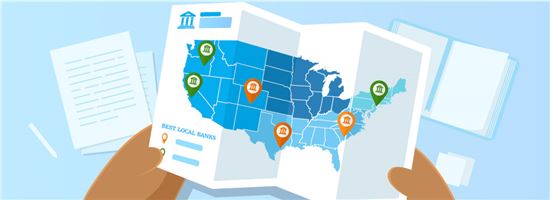 |
If you have a local business, a regional or community bank may fit your needs. It gives you the chance to build a personal relationship with your banker. They also have more interest in helping small businesses succeed.
Here are some of the best business checking accounts from regional banks:
Huntington Bank
Huntington Bank offers three business checking accounts depending on the size of your business. It even has a free account with no minimum balance.
All accounts come with digital tools to help you manage income and expenses. This bank has a large presence in the Midwest.
PNC Bank
The basic Business Checking lets you waive the $12 monthly maintenance fee by maintaining a $500 average monthly balance. The opening deposit is just $100.
TD Bank
TD Bank has a large footprint on the East Coast with over 1,100 locations. It's known for extended banking hours and 24/7 live customer service.
First Horizon Bank
First Horizon Bank offers a BizEssentials Checking account with no minimums or monthly service fee. This bank has a large presence across 12 southern states.
KeyBank
KeyBank has 3 business checking account options for businesses in different stages. The Basic Business Checking lets you waive the monthly fee of $5 with only $1,000 average daily balance.
All accounts let you deposit up to $25,000 each month for free, so it's great for small businesses that take cash.
Small banks generally have less fees than the big banks. They may also be able to offer better loan terms. Plus, a small local bank is more likely to support local businesses. However, the trade-off is that they may not provide as many services.
Best Type of Bank to Open a Business Account
 |
The first step is to decide what kind of bank you want to use for your small business. There are three main types:
- National bank
These are the big banks with a lot of branches and ATMs across the nation. They're convenient and usually offer more services and products. This could be a good choice for more established businesses. - Local bank
Micro businesses may benefit more from a local bank or credit union. A smaller bank is more likely to take a greater interest in helping local businesses grow. - Online bank
This option is good for online businesses or freelancers who don't need cash deposits. Online banks have less fees and requirements. As a bonus, they often offer higher interest rates than traditional banks.
How to Choose the Right Bank for Business
 |
When choosing the best business bank account for your needs, think about what perks or features you'd like.
Consider these things:
- Fees and account balance requirements
We have free accounts on our list. But many banks have a minimum balance requirement to waive the monthly service fees. Can your business comfortably meet that requirement? - Transaction limits
How many monthly transactions do you expect? Some accounts give you a certain number of free transactions per month. Beyond that, they charge a fee for each one.Transaction items include debits, credits, ACH transfers, and check deposits. - Cash deposit
If your business takes in a lot of cash, look for an account with a higher amount of fee-free cash deposits. Also note that some online accounts don't allow for cash deposits. - Size of bank
Large national banks are more convenient. On the other hand, local banks or credit unions offer more personalized service. They may be able to get you a better deal on a loan or provide more aid if something happens.One of the best resources for entrepreneurs is the Small Business Development Center. This nonprofit organization can help you with marketing, business loans and more. - Accessibility
If you need to deposit and withdraw cash often, a brick-and-mortar bank may be better for you. Check that your bank has branches and ATMs near you.If you're okay with purely online and mobile banking, then an online bank can help you save. You can bank from anywhere on your smartphone.
- Cash management
Does the account have features to help manage your cash? For example, Bank of America has built-in tools. Novo has Reserves for you to set aside funds for business savings goals.Read more about cash management solutions. - Software integration
See if the business checking account integrates with accounting software like QuickBooks, FreshBooks, or Xero. This matters because it could make your life easier. - Small business loans
Even if you don't need a loan now, you may later. Having a personal relationship with your bank may help you obtain these resources or get a better interest rate.You may want to see if the bank provides SBA loans. These loans give financing opportunities to businesses that can't get a traditional bank loan. - Customer support
It's important to get help from a real person when you need it. Read other customers' bank reviews to get an idea of how responsive they are.
Why Have a Business Bank Account
 |
If you're running an LLC or corporation, you must have a separate business bank account. You're considered a separate legal entity, so you also must separate your finances. This will protect you from personal liability in case of lawsuits or debts.
If you're a freelancer or sole proprietor, you don't legally need a business checking account. You could technically use your personal bank account. But separating finances will make your life easier.
Here are some good reasons why all businesses should have a business bank account:
- Easier to calculate business expenses during tax time and leave a clear trail for the IRS.
- Present a more professional image to clients and vendors.
- Be able to apply for small business loans.
- Accept credit card payments from customers.
- Give debit cards and access to team members.
There are benefits to using the same bank for both accounts. For one, it may be easier to open a business account because you already have an established relationship. Some banks also offer relationship discounts to existing customers.
However, you may find better deals for business accounts elsewhere. And using a different bank for your business can help maximize your FDIC insurance.
How to Open A Small Business Bank Account
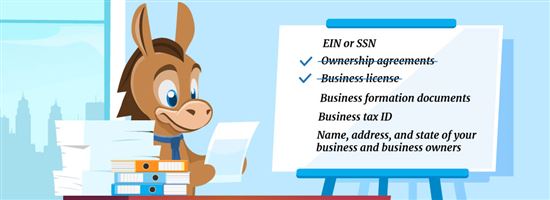 |
Opening a business bank account is easy. Most banks will even let you do it online — no need to drop by a branch anymore.
Whether you do it online or in person, here are the usual steps you should take note of:
- Choose what account to open.
As a small business owner, you definitely need a business checking account for day-to-day business activities, like receiving deposits, making business purchases, paying vendors, and more.Once you've got extra funds, it's smart to have a business savings account too. It's good for stashing your business emergency fund and savings for future business projects. They can even earn interest to help your money grow.
- Gather the required documents.
Banks have different requirements for opening a business account, depending on your business structure and industry.But most will look for the following documents:
- EIN or SSN (if you're a sole proprietor)
- Business formation documents
- Ownership agreements
- Business license
- Name, address, and state of your business and business owners
Other possible documents the bank may look for are a DBA certificate (if using an assumed/trade name), 501 (c), corporate charter or resolution, etc.
If you're not sure what documents you should prepare, you can always contact your bank beforehand to verify. This can save you the time of going on multiple trips to the bank just to submit all the requirements. - EIN or SSN (if you're a sole proprietor)
- Open your account.
Once everything's ready, you can go ahead and open the account. Again, most banks will allow you to do it online, especially if you're a sole proprietor.However, if you have an LLC, corporation, or partnership, you and any partners may need to meet a banker in person. Each bank has its own rules, so make sure to double-check.
- Fund your account.
When your bank account's ready, all that's left is to fund it, so you can start using it for business transactions.Some banks require an initial deposit, usually $25 to $100, during the application process. Others allow you to fund the account after it's opened, generally within 45 to 60 days.
Having multiple business bank accounts isn't necessary, but it can help you organize your finances. For example, you can have separate accounts for operations, payroll, taxes, etc.
Methodology
We compared dozens of both traditional and online banks to curate this list of the best banks for small businesses. To start, we looked at the different kinds of businesses out there.
We looked for unique bank accounts that tackle the challenges faced by various businesses. For example, a freelancer may struggle with taxes, while a retailer would need credit card processing. You're sure to find a bank that fits your needs.
We also made sure these banks are available to everyone nationwide. And of course, we don't believe in paying to bank. So these banks have easy ways to waive the monthly fees. Many banks on our list are even free.
And finally, all the banks have excellent security and are FDIC insured. So you can trust that your business funds are safe.
Small Business Banking FAQ
Do I need a business bank account as a sole proprietor?
Sole proprietors aren't required to have a separate bank account. But it's still smart not to mix personal and business finances. Or else it'll be a big pain during tax time.
Do I need a business bank account as an LLC?
LLCs are legally required to have a separate bank account, because the owners and the LLC are separate entities. You're protected from personal liability if your business gets sued. So you need to maintain the separation with a dedicated business bank account.
What banks offer free business checking accounts?
A lot of fintech companies offer free online business checking accounts, such as Bluevine and Lili. If you prefer a physical bank, U.S. Bank Business Essentials is a free business account.
What is the minimum amount to open a business account?
Each bank has their own requirements. But you can open a business checking account with $0. Some banks, like Bank of America, only require $100 to open.
Do I need an EIN to open a business bank account?
Sole proprietors and single-member LLCs can use their SSN to open a business bank account. But you need an EIN if you hire employees or form an LLC or corporation. Check if you need an EIN here.
Can I open a business checking account with bad credit?
Yes, you can. Some business bank accounts, like Lili and Novo, have no credit check. Or you can try to open an account with your local bank or credit union, as they may have more lax requirements.
What Experts Say
 |
As part of our series on small businesses, CreditDonkey assembled a team of industry experts to answer readers' most pressing questions. Here's what they said.
Bottom Line
Picking the best bank for your small business needs is important to your success and growth. You'll need it to manage your business finances. Plus, it'll help when applying for a business loan or other services.
Consider all your options to see what makes the most sense for your small business banking needs. Pay attention to the fine print before signing up. If you're unhappy with your choice or your business needs change, you can switch to another bank, but it'll be a hassle.
Additional Resources
Business Checking Account Promotions
Chase Business Complete Banking® - Up to $500 Bonus
- Earn up to $500 when you open a new Chase Business Complete Checking® account. For new Chase business checking customers with qualifying activities.
- Get added features at no additional costs. Choose Chase Business Complete Banking® to get a fully integrated business solution that can help you control costs. Waive the $15 Monthly Service Fee in multiple ways like keeping a minimum $2,000 balance, plus use built-in offerings such as card acceptance, invoicing, Chase Customer Insights and Tap to Pay on iPhone at no additional cost.
- Bank with confidence. Feel confident knowing we have the largest branch network in the U.S. with 5,000 branches that provide personalized service and can help with your complex banking needs. You can also benefit from our account protection services, which provide safeguards by overseeing employee account activity, monitoring checks, and offering additional protection for your business.
- Access top-rated online business banking. Take advantage of our #1-ranked online small business banking platform with a comprehensive set of features designed for small business owners like you. Our tools enhance your ability to manage cash flow, accept and make payments, create invoices and plan for growth, so you can streamline processes and gain greater control of your finances.
Bank of America® Business Advantage Banking - $400 or $750 Cash Bonus Offer
- The $400 or $750 cash bonus offer is an online only offer and must be opened through the Bank of America promotional page.
- The offer is for new eligible business checking customers only.
- Offer expires 12/31/2026.
- To qualify, a new Business Advantage Relationship Banking or Business Advantage Fundamentals™ Banking account through the promotional page and deposit New Money* directly into that new eligible account within thirty (30) days of account opening (“Deposit Period”). At the
end of the Deposit Period, all New Money deposits made directly into new eligible Business Advantage Banking account will be totaled to determine which Balance Requirement you have met and which corresponding Cash Bonus Tier you
are eligible for.
Balance Requirement Cash Bonus Tier $5,000 $400 $15,000 $750 - Maintain a daily balance in that new Business Advantage Banking account that meets the applicable Balance Requirement during the Maintenance Period**
- After you satisfy all of the requirements, Bank of America will attempt to deposit your earned bonus directly into your new eligible Bank of America Business Advantage Banking account within 60 days.
- Additional terms and conditions apply. See offer page for more details.
- *New Money is new funds deposited into your Business Advantage Banking account that are not transfers from other Bank of America accounts or Merrill investment accounts.
- ** The Maintenance Period begins thirty-one (31) calendar days after account opening and ends ninety (90) calendar days after account opening.
- Bank of America, N.A. Member FDIC
Free Business Checking - Earn $500 Bonus
To earn the $500 bonus, customers must apply for a Bluevine Business Checking account anytime between now and 03/31/2026 using the referral code CD500.
After opening your account, deposit a total of $5,000 within the first 30 days. After 30 days, maintain a minimum daily balance of $5,000 while also completing at least one of the following eligibility requirements every 30 days for 90 days:
- Deposit at least $5,000 from eligible merchant services to your Bluevine account OR
- Make at least $5,000 of outbound payroll payments from your Bluevine account using eligible payroll providers OR
- Spend at least $2,000 on eligible transactions with your Bluevine Business Debit Mastercard® and/or Bluevine Business Cashback Mastercard®
Banking services provided by Coastal Community Bank, Member FDIC
Basic Business Checking - Up to $200 Bonus
- Open a Basic Business Checking account using promo code START200 by June 30, 2026.
- Every dollar counts when you're starting out. That's why new businesses can earn up to $200 opening a new Basic Business Checking account today.
- No initial deposit requirement
- No minimum balance requirement
- No monthly maintenance fees
- Free domestic incoming wires. Two (2) outgoing domestic wire fees reimbursed per month.
- Unlimited domestic ATM fee reimbursements
- Unlimited item processing (debits, credits, and deposited items)
- Cash deposits via MoneyPass and Allpoint networks
25% Discount on Scale Plan
Get Scale Plan for $90/month instead of $120/month. This offer is for a limited time only and may change without notice.
Business Checking Promotions for Alabama
Business Checking Promotions for Arizona
Business Checking Promotions for Arkansas
Business Checking Promotions for California
Business Checking Promotions for Colorado
Business Checking Promotions for Connecticut
Business Checking Promotions for Delaware
Business Checking Promotions for Florida
Business Checking Promotions for Georgia
Business Checking Promotions for Idaho
Business Checking Promotions for Illinois
Business Checking Promotions for Indiana
Business Checking Promotions for Iowa
Business Checking Promotions for Kansas
Business Checking Promotions for Kentucky
Business Checking Promotions for Louisiana
Business Checking Promotions for Maine
Business Checking Promotions for Maryland
Business Checking Promotions for Massachusetts
Business Checking Promotions for Michigan
Business Checking Promotions for Minnesota
Business Checking Promotions for Mississippi
Business Checking Promotions for Missouri
Business Checking Promotions for Montana
Business Checking Promotions for Nebraska
Business Checking Promotions for Nevada
Business Checking Promotions for New Hampshire
Business Checking Promotions for New Jersey
Business Checking Promotions for New Mexico
Business Checking Promotions for New York
Business Checking Promotions for North Carolina
Business Checking Promotions for North Dakota
Business Checking Promotions for Ohio
Business Checking Promotions for Oklahoma
Business Checking Promotions for Oregon
Business Checking Promotions for Pennsylvania
Business Checking Promotions for Rhode Island
Business Checking Promotions for South Carolina
Business Checking Promotions for South Dakota
Business Checking Promotions for Tennessee
Business Checking Promotions for Texas
Business Checking Promotions for Utah
Business Checking Promotions for Vermont
Business Checking Promotions for Virginia
Business Checking Promotions for Washington
Business Checking Promotions for West Virginia
Business Checking Promotions for Wisconsin
Business Checking Promotions for Wyoming
Additional Resources
References
- ^ Bluevine. Interest Earned on Bluevine Business Checking Account, Retrieved 11/13/2026
- ^ Bluevine. Line of Credit, Retrieved 11/13/2026
- ^ Axos Bank, Business Interest Checking, Retrieved 11/13/2026
- ^ NBKC Bank. How do I fund my business account?, Retrieved 11/13/2026
- ^ NBKC Bank. How do I make a deposit at an ATM?, Retrieved 11/13/2026
- ^ NBKC Bank. Business Money Market in Kansas City, Retrieved 11/13/2026
- ^ nbkc. Rate and Fee Schedule, Retrieved 11/13/2026
- ^ NBKC Bank. Business Loans in Kansas City, Retrieved 11/13/2026
- ^ Live Oak Bank. When do I start earning interest on my Live Oak Bank savings account?, Retrieved 11/13/2026
- ^ Live Oak Bank. Insured Cash Sweep, Retrieved 11/13/2026
- ^ Lili. Plans, Retrieved 11/13/2026
- ^ FDIC. Deposit Insurance FAQs, Retrieved 11/13/2026
- ^ FDIC. Are My Deposit Accounts Insured by the FDIC?, Retrieved 11/13/2026
Write to Samantha Tatro at feedback@creditdonkey.com. Follow us on Twitter and Facebook for our latest posts.
Note: This website is made possible through financial relationships with some of the products and services mentioned on this site. We may receive compensation if you shop through links in our content. You do not have to use our links, but you help support CreditDonkey if you do.
|
|
| ||||||
|
|
|















